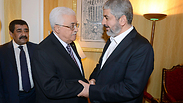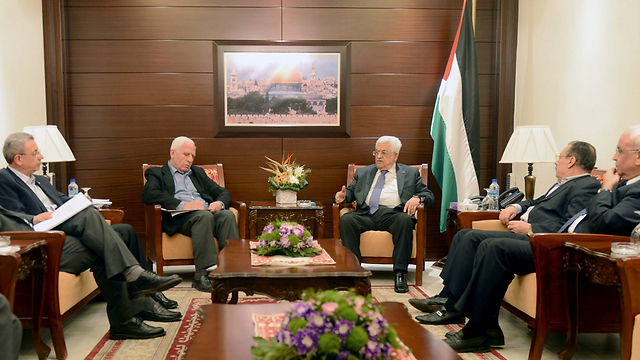
Abbas with Hamas leader Khalad Mashaal
צילום: רויטרס
Palestinians minister slams Hamas' incitment
PA's Religious Affairs Minister Al-Habbash says nonviolence resistance is moving Palestinian state forward, claims unity government will be 'under ideology of Palestinian Liberation Organization, not Hamas'
A senior aide to Palestinian President Mahmoud Abbas said the Palestinian leadership rejects any efforts to teach Palestinian children a culture of violence. Mahmoud Al-Habbash, the Palestinian Minister of Waqf and Religious Affairs was responding to a report on Israel’s Channel 2 on a Hamas rally in the northern West Bank city of Jenin.
In the video, Palestinian boys, some of them wearing black ski masks, carried toy guns and waved the Islamist group’s green and white flag. One boy said he wanted to become a “martyr” and take revenge on Israeli soldiers for killing his uncle. Other boys said they wanted to “resist” Israeli control of “Palestine.”
“It will be very dangerous to allow any party to educate the children according to the ideology of this party (Hamas),” Al-Habbash told The Media Line. “The children must be educated according to the Palestinian culture, Palestinian understanding, and Palestinian heritage without any relation to violence.”
Al-Habbash went on to explain that Islam is a peaceful religion in dialogue with all peoples. “We reject violence against anybody, against Muslims, against Christians, against Jews, against anybody in the world,”
The Palestinian official says they want to see a new culture and mentality among the Palestinian community. But he said, Israel often makes this difficult with anti-Palestinian rhetoric. “If you don’t want us to speak about violence, Israel should stop their violence,” he said.
Under the PLO
The Channel 2 video was broadcast days before a new Palestinian unity government was scheduled to be announced. In April, the two former bitter rivals of Hamas and Fatah reached an agreement on “national reconciliation” calling for a joint interim government of technical experts to pave the way for Palestinian elections in six months. The last elections were held in 2006, when Hamas won a surprise victory. The following year, Hamas took over Gaza after a violent confrontation with Fatah.The technocrat government would be “under the umbrella and the ideology of the Palestinian Liberation Organization,( PLO),” what Al-Habbash called “the one voice of the Palestinians.” He said he hoped it would be a real reconciliation and not just a tactic. Unity would also answer Israel’s suspicions that even if a peace deal is reached with Abbas, Hamas would not accept such a deal.
Some Palestinians said that reining in these Hamas demonstrations will not be easy for Fatah.
“This is one of the challenges - to show to what extent the parties are in agreement (on reconciliation),” political analyst Ghassan Al-Khatib told The Media Line.
He said the question of how to merge the Hamas security forces in Gaza with the Palestinian Authority (PA) security in the West Bank has always been a “sticky” issue.
Mahmoud Al-Habbash said the PA will do its job according to the law, whether the violations occur in Jenin or in Ramallah, the Palestinians financial and political capital.
“There is one Palestinian law, one Palestinian Authority, one Palestinian leadership, and one Palestinian security forces,” he said.
Nonviolence yields fruit
Chairman of the political committee of the Palestinian Legislative Council and senior Fatah official Abdullah Abdullah said he thinks Hamas has learned a lesson from the downfall of its mentor the Muslim Brotherhood in Egypt.
“Nonviolent resistance is bearing fruit for the cause of Palestine,” Abdullah told The Media Line. “The leadership has to choose what is possible and beneficial for our people, our cause and for our national program.”
Others are skeptical that the unity government will succeed in overcoming the differences between Hamas and Fatah.
Palestinian journalist Hossam Ezzedine said that Fatah and Hamas each had their own reasons for wanting a unity government.
Hamas was weakened after the Muslim Brotherhood was outlawed in Egypt and has found it harder to finance its government. At the same time, Abbas wanted to act following the blow-up of negotiations with Israel.
“The reconciliation and the new Palestinian government came from the political situation, not from (Palestinian) street needs,” said Ezzidine.
But Palestinian official Al-Habbash insists otherwise.
“Abbas doesn’t want to change Hamas, the ideology of Hamas, or the strategy of Hamas…every party is free to have its own ideology, its own strategy,” he said.
Article written by Abdullah H. Erakat
Reprinted with permission from The Media Line











